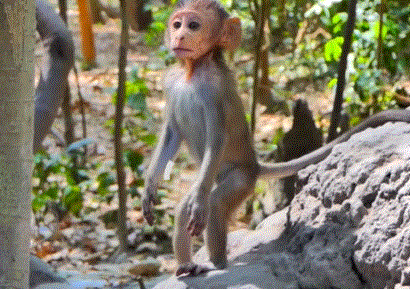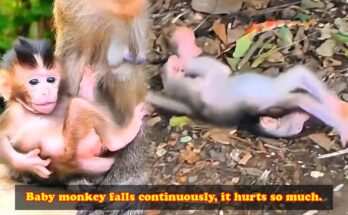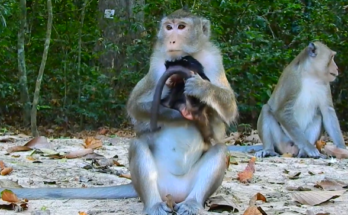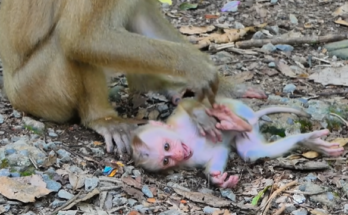The morning mist lifted slowly from the ancient stones of Angkor Wat, wrapping the forest in a veil of gold and green. The sound of rustling leaves mixed with the faint echoes of temple bells carried from far away. Among the roots of banyan trees, a small family of macaques stirred — stretching, grooming, and foraging as the sun began to rise.
Tiny Draya was the youngest of them all — barely a few months old, with fur as soft as silk and eyes as wide as the world itself. She clung to her mother Tara’s chest as they moved through the mossy stones, her little fingers curling around strands of her mother’s fur. To Draya, every day was a new discovery.

But that morning, the calm rhythm of the forest changed.
Three adult females, older and larger than Tara, gathered near the fruit pile that had been left by tourists the evening before. There was always tension when food was involved. One snatched a banana, another hissed, and suddenly — a shove, a screech, and the still air broke into chaos.
Tara tried to step away, clutching Draya tightly, but one of the females lunged forward, teeth bared. The troop erupted. The forest, moments ago filled with calm chatter, now pulsed with fear and fury.
Draya, terrified by the sudden noise, loosened her grip.
In one brief second, as Tara turned to defend herself, Draya slipped. Her small body tumbled down the uneven roots and hit the soft earth below with a thud.
A cry pierced the forest — high, thin, trembling.
Draya’s tiny face crumpled. She tried to crawl, but her legs shook under her. She looked up at the towering figures of fighting adults, unable to understand why her mother wasn’t there.
Her cries became desperate — the kind that made birds fall silent.
She looked around, wide-eyed and lost. A passing female brushed by roughly, knocking her sideways again. The world was spinning — shadows, dust, sound. For the first time, Draya was truly alone.
Up above, Tara’s heart raced.
She heard that cry — the unmistakable voice of her baby. But the chaos trapped her. The other females cornered her, their shrieks cutting through the air. Every instinct screamed at her to run, to find her child. And then, just as quickly as it began, the fight broke apart.
Tara didn’t hesitate.
She bounded down the slope, eyes darting wildly. And there she saw her — her baby, small and trembling, calling out between sobs.
With a single leap, Tara reached her. She scooped Draya up, pressing her against her chest. The baby clung tightly, burying her face into her mother’s fur as if to hide from the world. Tara held her, rocking gently, whispering soft grunts of reassurance — the ancient language of comfort that only mothers know.
The forest seemed to exhale.
Even the sunlight softened, filtering through the trees like a curtain of gold. The echo of fear slowly faded into peace.
Tara began to groom Draya carefully, checking her tiny arms, her back, her head. Her gentle fingers combed through the fur, removing dust and calming the baby’s heartbeat. Draya’s sobs turned into quiet hiccups.
Her mother’s scent — warm, familiar, safe — filled her tiny world again.
They sat like that for a long while, under a twisted fig tree near the temple’s north wall. The sound of the troop returned — cautious at first, then normal. Young monkeys chased each other nearby, older ones foraged in the grass. Life, as it always does in the wild, moved on.
But Tara stayed still, her eyes never leaving Draya. She nuzzled her gently, pressing her nose against her baby’s cheek. It was as if she was apologizing — not in words, but in touch, in the soft hum of her heartbeat.
Draya responded by wrapping her tiny arms around Tara’s neck, her face pressed deep into the warmth of her mother’s fur. She made a small cooing sound — the sound of safety rediscovered.
And in that moment, something changed between them.
Tara realized how fragile her baby’s life was — how quickly fear could steal peace away. And Draya learned something too: that even when the world turns loud and cruel, her mother will always come.
As the afternoon light shifted, the two of them climbed back up the temple roots. Tara moved carefully, keeping one arm always around Draya. From above, a few curious young monkeys peeked down, watching silently.
When they reached the top, the troop began to rest among the warm stones. Draya nestled into Tara’s lap, her head rising and falling with her mother’s breathing.
The forest had returned to its usual rhythm — distant bird calls, the hum of insects, the whisper of leaves. But for Tara and Draya, the world felt newly sacred.
Tara looked up at the canopy, the sunlight glimmering through. Maybe she didn’t understand the human word for love, but she lived it — every heartbeat, every touch, every time she ran toward her baby instead of away.
By sunset, as the orange glow bathed the temple’s ancient faces, Tara carried Draya on her back. The day that began with chaos ended with calm. The two of them disappeared into the forest’s fading light — shadows moving gently, mother and child as one.
And high above, as the last call of the cicadas echoed through Angkor Wat, the old trees stood witness — to fear, to survival, and to love that never lets go.


